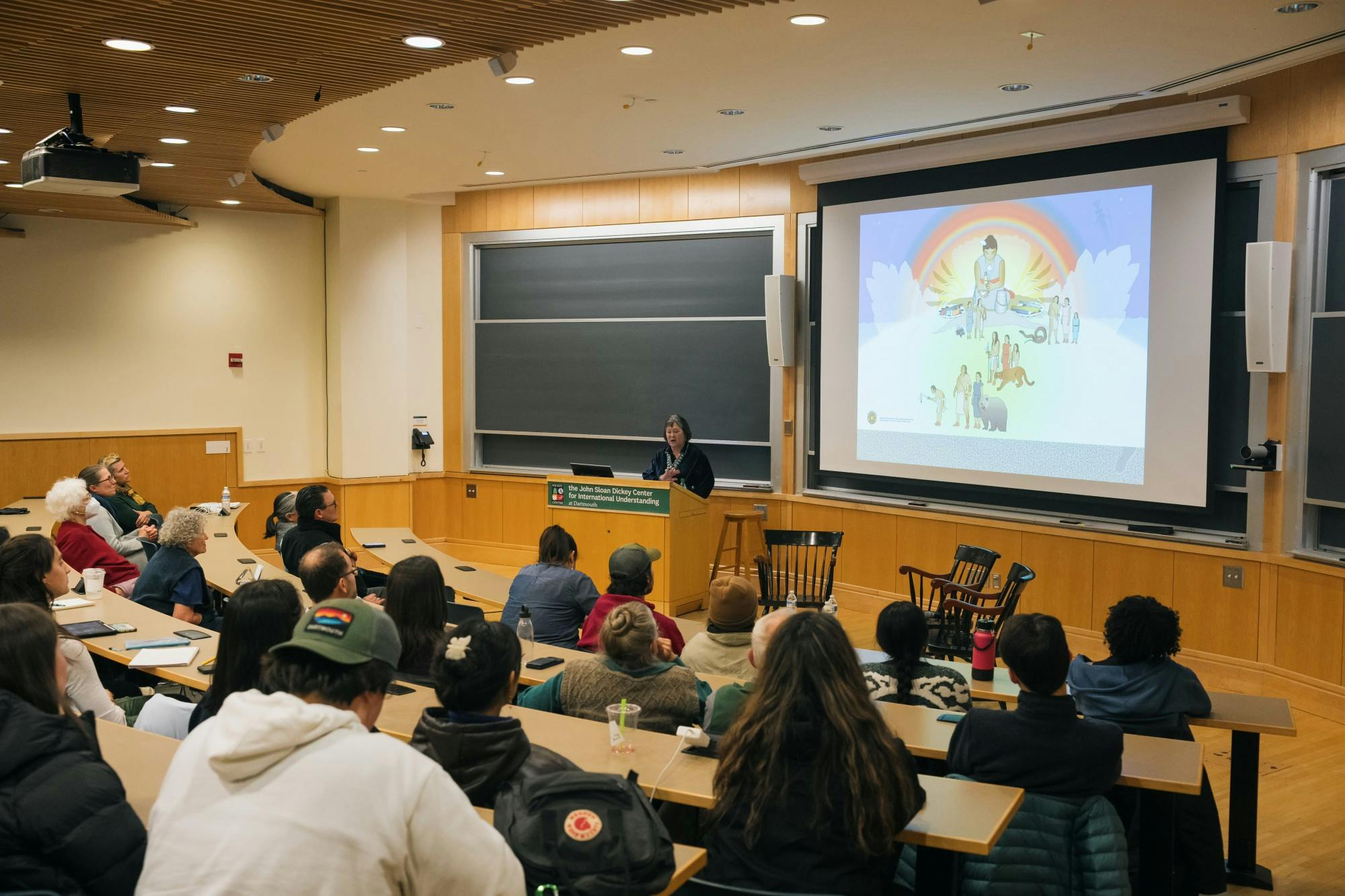On Monday, Lori Arviso Alvord ’79 — the first member of the Navajo Nation to be board certified in general surgery — spoke to about 50 attendees at an event held in the Kreindler Conference Hall. The event, titled “Integrating Healing Properties of Traditional Native Medicine with Western Practice,” was hosted by the Dickey Center for International Understanding.
Alvord — who graduated from Dartmouth with a double major in psychology and sociology — has practiced surgery for over 30 years. She completed her general surgery residency in 1991 after graduating from Stanford University Medical School, and returned to the Navajo Nation to practice surgery at Gallup Indian Medical Center for six years. In 1997, Alvord accepted a position to serve as an associate dean and professor at the Geisel School of Medicine, which she held for 12 years. She is currently a surgeon and chief of staff at Astria Health, a healthcare system in eastern Washington.
Dickey Center director Victoria Holt said in her opening remarks that Alvord has led a “lifelong path of living and learning in multiple worlds” and has dedicated her career “bringing the best of those worlds” to clinical practice.
After introducing herself to the audience in the Navajo language, Alvord spoke about the depth of her connection to Dartmouth. Alvord noted that she is “the product of Dartmouth,” explaining how the Native American Program and Native American and Indigenous Studies impacted her career trajectory.
“If I had not had that start, I don’t know that I would be a surgeon and an author,” Alvord said.
Alvord introduced the topic of Navajo medicine by reading a selection from “The Scalpel and the Silver Bear” — a memoir she published in 1999 — that described a night chant ceremony.
“The purpose of the ceremony is to help the patient return to a way of thinking and living in harmony and balance,” Alvord said. “While training at Stanford, I had longed for something like it for my non-Indian patients, who went alone or nearly alone. Their minds and their spirits were often not prepared for surgery, and could not assist in healing them.”
Alvord spoke about one of her ancestors — her grandmother’s grandfather, Jesus Arviso — who was of Spanish descent but was raised among the Navajos and became the chief interpreter for the Navajo tribe. Alvaro then showed the audience an image of Chaco Canyon, which she explained was “one of the homes of the Anasazi,” a Native American civilization.
“We’re going to Chaco to talk about ancient wisdom,” Alvord said. “Our ceremonies are extremely elaborate,” she said, because they represent an accumulation of centuries of Navajo wisdom.
Alvord walked the audience through important elements of ceremonies and Navajo practices, including meditation, guided imagery, chanting, drumming and sand painting — which she said are “areas where healing can happen.” Alvord spoke about Western studies that have proven the benefits of these practices. For example, meditation “can increase your immune response to influenza,” while diet can also have a major impact on health. She added that Western lifestyles result in harmful eating patterns, while traditional Navajo diets “have more vegetables and less meat” and “Native people did not eat three times a day.”
“Our spirituality strengthens our relationships to each other, but also to animals and the environment,” Alvord said. “Why wouldn’t all of these things help you heal?”
Alvord also talked about the way the mind impacts physical health. She said that when she was pregnant, she was told by Navajo nurses “to be careful what [she] thought,” and she recalled being shocked when she read Western medical research that verified that stress increased the chances of harmful outcomes during pregnancy.
“Thoughts have great power and meaning, and it’s possible to think or speak something into existence,” Alvord said. “What goes into our minds actually does affect our health, in many dimensions.”
After delivering her lecture, Alvord was joined by director of diversity, inclusion and community engagement at the Geisel School of Medicine Shawn O’Leary and assistant director of the Native American Program Mabelle Drake Hueston ’86 for a short period of questions.
Hueston noted that having Alvord as a speaker “fits perfectly with what [they] are trying to do at the Dickey Center with this lecture series,” adding that she became more excited after reading Alvord’s book.
“I love how she brings the beginnings of bringing the Navajo way of thinking into the hospitals,” Drake Hueston said.
Perciliana Moquino ’26, who is from the Kewa Pueblo in New Mexico, attended a book discussion with Alvord on Tuesday. She said that she enjoyed Alvord’s focus on holistic medicine and patient well-being, and learning about the “different medicines” required for healing.
“For me, it was affirmational,” Moquino said. “It was a beautiful talk.”
Kent Friel ‘26 is an executive editor at The Dartmouth.




